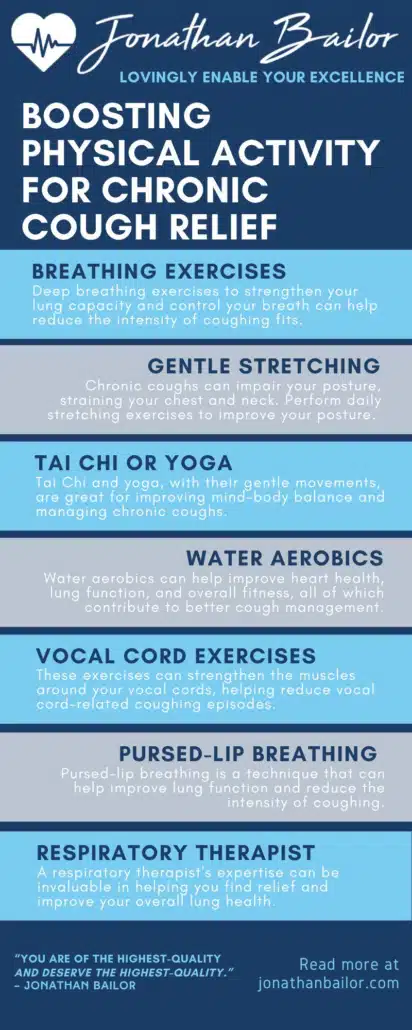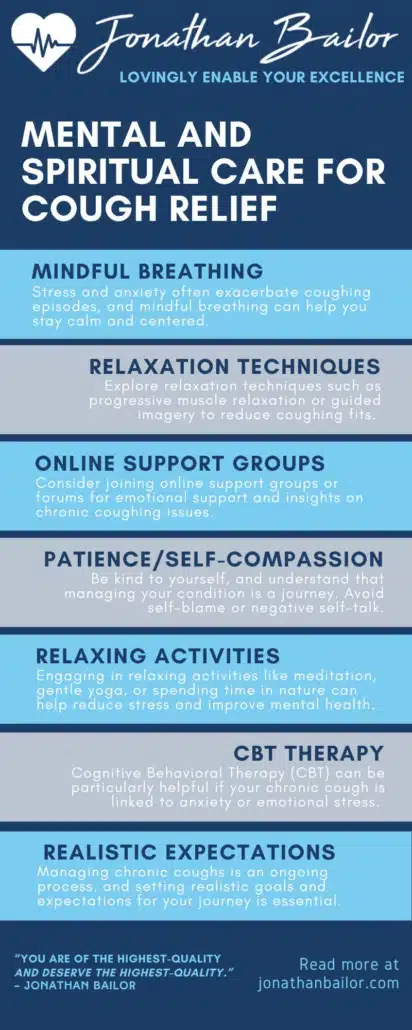26 Tips for Managing Chronic Coughs Without Medication
Here are 26 amazing tips for managing chronic coughs without medication with Jonathan Bailor! Imagine sitting in a cozy chair, sipping a warm cup of tea, and taking a deep breath, savoring a moment of calm. Life is full of beautiful moments like these, but what if an incessant cough threatens to steal your tranquility? It’s a challenge many people face, and everyone deserves a life free from the constant irritation of a nagging cough. That’s why you’ve stumbled upon this treasure trove of wisdom—a guide to managing chronic coughs without relying on medications.
If you need help with cough or phlegm then make sure to check out our 25 Tips for Managing Chronic Coughs Without Medication: Timetable & Guide and 28 Habits for Minimizing Phlegm Build-Up During Cold Season Now and Later guides!
This post has been crafted with your needs in mind, a heart-to-heart conversation offering practical, compassionate advice. If you’re someone who seeks a cough-free life, you’ll find this blog post a refreshing source of inspiration.
As you take a deep dive into the 26 tips for managing chronic coughs, you’ll not only discover remedies to help tame your cough reflex but also uncover a valuable resource to share with friends and family. Because everyone deserves the gift of good health and well-being, and sharing is caring, right?
So, get ready to breathe easier. This cough and phlegm post is more than just a collection of tips—it’s a roadmap to a cough-free life that you can trust and share with confidence. Let’s embark on this journey together and take the first step towards reclaiming your peace and well-being.
Transforming Your Lifestyle for Chronic Cough Relief
1. Stay Hydrated for Soothing Relief
One of the simplest yet most effective lifestyle changes you can make to alleviate chronic coughing is to stay well-hydrated. Ensuring you drink enough water throughout the day helps keep the mucous membranes in your airways moist, reducing irritation and the urge to cough. This method works well if coughing is your only symptom. Aim for at least eight glasses of water daily, and consider adding soothing herbal teas like chamomile or ginger to your routine. Proper hydration can make a world of difference in calming that persistent cough.
2. Create a Smoke-Free Environment
Creating a smoke-free environment is another lifestyle change that can significantly impact your coughing. Exposure to secondhand smoke can exacerbate coughing, especially if you’re sensitive to it. If you or someone you live with smokes, consider establishing designated smoking areas outside the home to minimize exposure. Reducing indoor pollutants and irritants will go a long way in helping you breathe easier.
3. Optimize Sleep Hygiene for Restful Nights
Chronic coughs often disrupt your sleep, leaving you feeling tired and irritable. Improving your sleep hygiene can be a game-changer. Create a comfy sleep environment, keep a regular sleep schedule, and avoid stimulating activities before bedtime. Elevate your head slightly with pillows to ease postnasal drip, also called upper airway cough syndrome, a common cough trigger at night.
A good night’s sleep can help your body recover and repair, ultimately reducing the frequency and intensity of your cough.
4. Practice Proper Respiratory Etiquette
In today’s world, good respiratory etiquette is essential, not only for your own health but also for those around you. Cover your mouth and nose with a tissue or your elbow when you cough or sneeze to prevent the spread of germs. Dispose of tissues properly and wash your hands thoroughly. Practicing these simple yet crucial habits can help reduce the risk of respiratory infections that might exacerbate your cough.
5. Keep Your Living Space Clean and Dust-Free
Maintaining a clean, dust-free living space can do wonders for your chronic cough. Regularly dust and vacuum your home, paying special attention to bedroom areas where you spend a significant portion of your time. Consider using allergen-proof covers on pillows and mattresses to reduce exposure to dust mites. A cleaner living environment can help minimize allergens and irritants that may trigger your coughing episodes.
These lifestyle changes may seem small, but they can have a significant impact on managing chronic coughs without medication. For individuals facing challenges related to weight and chronic health conditions, weight-loss drugs may complement these lifestyle adjustments. While not suitable for everyone, they can be considered under the guidance of a healthcare provider.
You’re taking meaningful steps towards a cough-free and more comfortable life by staying hydrated, creating a smoke-free environment, improving your sleep hygiene, practicing proper respiratory etiquette, and keeping your living space clean.

Feeling Better Is Priceless, That's Why We Don't Put A Price On It!
“It’s Like A Free and Medically Valid Version of Noom and Weight Watchers Online”
~ Dr. Doctor Matthew Oleshiak, MD
Click the 'LEARN MORE' button below for free lifetime access to the fast fix program developed by Jonathan and top Ivy League Medical Doctors
LEARN MOREP.S. It's not a free trial. It's not part of the program for free. The entire program is free, forever, for real! No credit card needed.
Revamping Your Diet for Chronic Cough Relief
1. Cut Back on Sugary and Carbonated Drinks
Sugary and carbonated beverages can be harsh on the throat and worsen coughing, especially if they irritate the sensitive lining of your airways. Consider reducing your consumption of sodas, sugary juices, and energy drinks. Opt for soothing herbal teas or water with a splash of lemon to help calm your cough.
2. Limit Dairy Products for Mucus and Phlegm Control
If you find that mucus exacerbates your cough, it might be helpful to limit dairy products. Some people experience increased mucus production after consuming dairy, which can lead to throat irritation and more coughing. Experiment with dairy alternatives like almond milk or coconut yogurt to see if they make a difference.
3. Incorporate Honey for Its Natural Healing Properties
Honey has been used for centuries to soothe coughs and sore throats due to its natural healing properties. Add a teaspoon of honey to your herbal tea or warm water to help alleviate irritation and reduce coughing. Just be cautious not to give honey to children under one-year-old due to the risk of infant botulism.
4. Choose Foods Rich in Vitamin C
Vitamin C is known for its immune-boosting properties, which can help your body fight off infections that may be contributing to your cough. Incorporate foods like oranges, strawberries, kiwi, and bell peppers into your diet to increase your vitamin C intake. These fruits and vegetables can provide the support your immune system needs to tackle cough-inducing illnesses.
5. Opt for Anti-Inflammatory Foods
Chronic inflammation can worsen cough symptoms. Incorporate anti-inflammatory foods like turmeric, ginger, and fatty fish (rich in omega-3 fatty acids) into your diet. These ingredients have been shown to help reduce inflammation and alleviate coughing.
6. Steam Your Veggies for Easier Digestion
If you have trouble with digestion and acid reflux triggers your cough, consider steaming your vegetables instead of consuming them raw. Steamed vegetables are gentler on the stomach and can reduce the likelihood of acid reflux-related coughing episodes.
7. Stay Hydrated with Water-Rich Foods
Proper hydration is essential for managing chronic coughs. In addition to drinking water, you can boost your hydration by consuming water-rich foods like cucumbers, watermelon, and lettuce. These foods not only provide essential nutrients but also help keep your throat and airways moist, reducing cough irritation.
By making these diet changes, you can take a proactive approach to managing your chronic cough. Dietary changes, combined with other health interventions, may also support weight loss goals. In certain cases, weight loss drugs may be recommended to aid in addressing weight-related health concerns that could indirectly impact respiratory health.
Reducing sugary drinks, limiting dairy, incorporating honey, increasing vitamin C and anti-inflammatory foods, steaming vegetables, and staying hydrated with water-rich foods can help you find relief and improve your overall well-being.

Transforming Your Physical Activity for Chronic Cough Relief
1. Practice Breathing Exercises for Lung Health
Engaging in breathing exercises can be a valuable addition to your routine for managing chronic coughs. Try deep breathing exercises to strengthen your lung capacity and control your breath. These exercises can help reduce the intensity of coughing fits and improve overall respiratory health.
2. Incorporate Gentle Stretching for Posture Improvement
Chronic coughs can negatively affect your posture, causing strain on your chest and neck. Add gentle stretching exercises into your everyday routine to improve your posture. Focus on stretches that open up the chest and relieve tension in the neck and shoulders. Better posture can reduce the frequency and severity of your coughing episodes.
3. Explore Tai Chi or Yoga for Mind-Body Balance
Tai Chi and yoga are excellent options for improving mind-body balance and managing chronic coughs. These practices focus on gentle movements, deep breathing, and relaxation techniques. They can help reduce stress, which is often linked to exacerbating coughing episodes, and improve overall respiratory function.
4. Engage in Water Aerobics for Low-Impact Exercise
If you’re looking for a low-impact form of exercise, consider water aerobics. Water’s buoyancy can help reduce stress on your joints while providing a full-body workout. Water aerobics can help improve cardiovascular health, enhance lung function, and boost your overall fitness, all of which contribute to better cough management.
5. Participate in Vocal Cord Exercises
Vocal cord exercises can be particularly beneficial if you have a chronic cough related to vocal cord dysfunction. These exercises aim to strengthen and coordinate the muscles around your vocal cords, which can help reduce coughing episodes triggered by vocal cord issues.
6. Embrace Pursed-Lip Breathing for Improved Lung Function
Pursed-lip breathing is a technique that can help improve lung function and reduce the intensity of coughing. To practice, inhale slowly through your nose for two counts and exhale through pursed lips for four counts. This controlled breathing can reduce the urge to cough and promote relaxation.
7. Consult with a Respiratory Therapist for Personalized Guidance
If you’re struggling to manage your chronic cough through physical activity changes, consider consulting with a respiratory therapist. They can provide personalized guidance and exercises tailored to your specific condition and needs. A therapist’s expertise can be invaluable in helping you find relief and improve your overall lung health.
These physical activity changes offer a holistic approach to managing chronic coughs. By incorporating breathing exercises, gentle stretching, mind-body practices, water aerobics, vocal cord exercises, pursed-lip breathing, or seeking guidance from a respiratory therapist, you can take proactive steps toward better cough management and improved well-being.

Nurturing Your Mental and Spiritual Well-being for Cough Relief
1. Practice Mindful Breathing for Stress Reduction
Mindfulness breathing exercises can be a powerful tool in managing chronic coughs. Stress and anxiety often exacerbate coughing episodes, and mindful breathing can help you stay calm and centered. Take a few moments each day to focus on your breath, inhaling deeply and exhaling slowly. This practice can reduce stress levels and, in turn, minimize the frequency and intensity of coughing fits.
2. Explore Relaxation Techniques for Emotional Balance
Chronic coughs can be emotionally taxing, leading to frustration and anxiety. To address this, explore relaxation techniques such as progressive muscle relaxation or guided imagery. These methods can help you relax your body and mind, providing emotional relief and reducing the urge to cough.
3. Seek Support Through Online Communities
Connecting with others who experience chronic coughs can be comforting and informative. Consider joining online support groups or forums for emotional support and insights. Sharing your journey with others who understand can alleviate feelings of isolation and empower you to manage your cough better.
4. Practice Patience and Self-Compassion
Living with a chronic cough can be frustrating, but practicing patience and self-compassion is essential. Be kind to yourself and understand that managing your condition is a journey. Avoid self-blame or negative self-talk, as these can increase stress and exacerbate your cough. Instead, focus on self-care and self-acceptance as you work toward relief.
5. Explore Relaxing Activities for Stress Reduction
Engaging in relaxing activities like meditation, gentle yoga, or even spending time in nature can help reduce stress and promote mental well-being. Stress reduction can have a positive impact on cough management by decreasing the frequency of coughing episodes triggered by emotional factors.
6. Consider Cognitive Behavioral Therapy (CBT)
Cognitive Behavioral Therapy (CBT) is a therapeutic approach that can be particularly helpful if your chronic cough is linked to anxiety or emotional stress. CBT can provide practical tools to identify and manage the thoughts and emotions contributing to your cough. It’s a structured and evidence-based method for addressing the psychological aspects of chronic cough symptoms.
7. Set Realistic Goals and Expectations
Managing chronic coughs is an ongoing process, and setting realistic goals and expectations for your journey is essential. Break down your goals into achievable steps, and celebrate your progress along the way. Maintaining a positive outlook and focusing on your mental and spiritual well-being can ultimately contribute to better cough management.
These mental and spiritual changes offer a holistic approach to dealing with chronic coughs. By practicing mindful breathing, exploring relaxation techniques, seeking support, practicing self-compassion, engaging in relaxing activities, considering CBT, and setting realistic goals, you can nurture your mental and spiritual well-being, leading to improved cough management and overall quality of life.

Coughing and Phlegm FAQ: Understanding the Basics
Q1: What causes chronic coughing and excess phlegm?
Chronic coughing and excess phlegm can result from a variety of underlying factors. Common causes include a respiratory tract infection (such as bronchitis or pneumonia), allergies, asthma, chronic bronchitis, postnasal drip, smoking, whooping cough, and environmental irritants. Cough variant asthma, however, is characterized by a dry, nonproductive cough, but that doesn’t make it any less unpleasant. In some cases, chronic conditions like gastroesophageal reflux disease (GERD) or chronic obstructive pulmonary disease (COPD) can also contribute to persistent coughing and phlegm production. Identifying the root cause through medical evaluation is essential to develop an effective management plan.
Q2: When should I be concerned about my chronic cough and phlegm?
If your chronic cough and excess phlegm persist for more than three weeks, it’s crucial to seek medical attention. Additionally, seek immediate medical care if you experience severe chest pain, high blood pressure, cough up blood, have difficulty breathing, notice sudden weight loss, or other symptoms. These symptoms may indicate underlying issues like lung cancer or bacterial infections that require prompt diagnosis and treatment. Early intervention can prevent complications and improve your quality of life.
Q3: Are there lifestyle changes that can help manage chronic cough and phlegm?
Yes, there are several lifestyle changes that can aid in managing chronic cough and excess phlegm. Staying well-hydrated, maintaining a smoke-free environment, improving sleep hygiene, practicing proper respiratory etiquette, and keeping your living space clean and dust-free are effective strategies. Additionally, consider incorporating breathing exercises, gentle stretching, and relaxation techniques into your routine to reduce stress, which can exacerbate coughing and phlegm production. Certain individuals may also use weight loss drugs as part of a broader strategy to address health concerns that influence chronic cough or respiratory issues. These medications should be used only after consulting a medical professional.
Q4: Can dietary changes help with chronic cough and phlegm?
Dietary modifications can play a role in managing chronic cough and phlegm. Cutting back on sugary and carbonated drinks, limiting dairy products if they trigger excess mucus production, incorporating honey for its soothing properties, increasing your intake of vitamin C-rich foods, opting for anti-inflammatory ingredients, and maintaining proper hydration with water-rich foods can all contribute to symptom relief. However, consulting with a healthcare professional for personalized dietary recommendations based on your specific condition is essential.
Q5: What mental and spiritual approaches can assist in managing chronic cough and phlegm?
Mental and spiritual well-being is integral to managing chronic cough and phlegm. Practices such as mindful breathing, relaxation techniques, seeking support through online communities, self-compassion, engaging in relaxing activities, considering cognitive behavioral therapy (CBT), and setting realistic goals can help reduce stress, anxiety, and emotional triggers that worsen coughing and phlegm. A holistic approach that addresses the psychological aspects of these symptoms can lead to improved overall well-being and cough management.
A Parting Note: Sharing the Key to Cough and Phlegm Relief
As we close this chapter on understanding and managing coughs and phlegm, remember that these insights are more than just personal guidelines; they’re pathways to shared wellness. If these answers have shed light on your experiences and offered relief, consider passing this knowledge along. Share these nuggets of wisdom with friends and family through social media or a thoughtful email. In doing so, you’re not just spreading information; you’re fostering a community of health-conscious individuals. Together, let’s embrace and share the journey towards better respiratory health and overall well-being.
Feeling Better Is Priceless, That's Why We Don't Put A Price On It!
“It’s Like A Free and Medically Valid Version of Noom and Weight Watchers Online”
~ Dr. Doctor Matthew Oleshiak, MD
Click the 'LEARN MORE' button below for free lifetime access to the fast fix program developed by Jonathan and top Ivy League Medical Doctors
LEARN MOREP.S. It's not a free trial. It's not part of the program for free. The entire program is free, forever, for real! No credit card needed.




